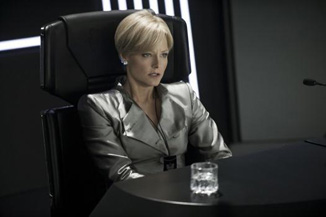The 400-Word Review: Elysium
By Sean Collier
August 12, 2013
BoxOfficeProphets.com

It’s 2154, and Max (Matt Damon) is a just a dude trying to walk the line. That’s less than easy on Earth, though; everyone with money has fled to Elysium, a giant mechanical suburb in orbit around the planet. Terrestrial folk have to deal with poverty, injustice and danger. Among the many problems faced by the Earthbound: aging, illness and death have been eliminated on Elysium, but they won’t share the technology...for some reason.
So when Max receives a lethal dose of radiation from an avoidable industrial accident, he launches a desperate effort to sneak onto Elysium for treatment. Unfortunately, Elysium’s head of defense, Delacourt (Jodie Foster,) is in the midst of mounting a coup that will make it even easier for her to kill Earthlings — and Max is in the way.
Elysium is Blomkamp’s follow-up to the Oscar-nominated District 9, and it revisits some of that film’s chief themes. The separations of the haves and have-nots, control over one’s own body and bureaucracy run rampant are all present here, as they were in the director’s debut feature. The metaphor is pointed enough to be clear to even the most apolitical of viewers: Elysium is rich people, Earth is poor people and health care is health care. Quicker comments on immigration, government surveillance and the prison system sneak in as well.
The messages are so heavy-handed that even those inclined to agree with Blomkamp — who also writes — may tire of them. That problem runs secondary to an issue of focus, however; it seems that Blomkamp was so concerned with the politics that he forgot about the plot.
His characters are fine enough, and all given full lives by a talented cast (Sharlto Copley, Diego Luna and William Fichtner all stand out.) But key details of the story itself are glossed over or omitted. A key bit of business that leads directly to the climax (vaguely put: control over some computer code that can do lots of crazy stuff) isn’t even partially explained.
Fortunately, Blomkamp is supremely talented as a director and puts together a fully-realized world that’s evocative and compelling. Elysium suffers on reflection, but feels unstoppable while it’s going. It’s imperfect, but more than worthy of significant attention.
Sean Collier is the Associate Editor of Pittsburgh Magazine and a member of the Broadcast Film Critics Association. Read more from Sean at pittsburghmagazine.com/afterdark